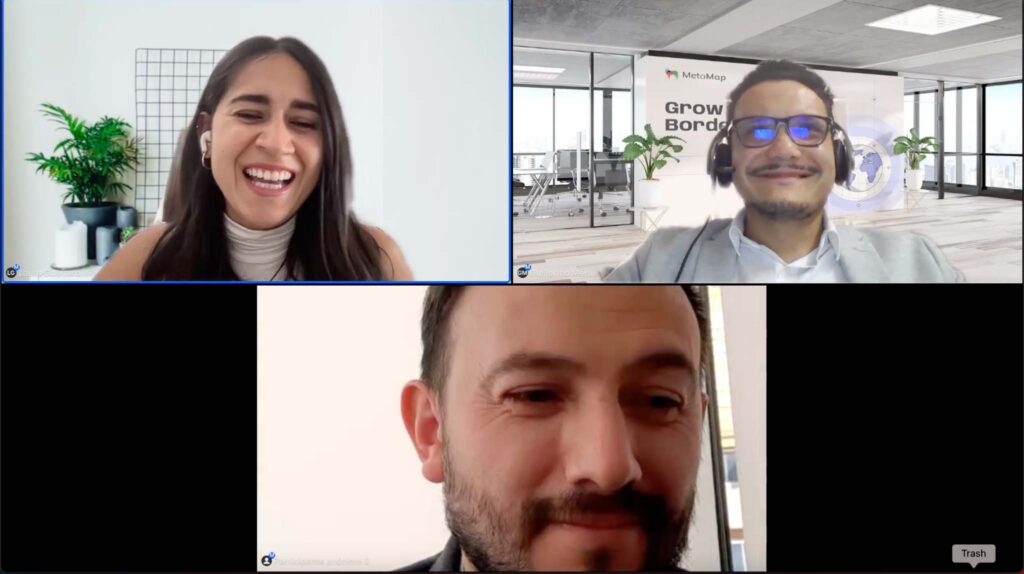Contents
 José Cantanhede
Account Executive Brazil at MetaMap
José Cantanhede
Account Executive Brazil at MetaMap  Rachel Fraga
Customer Success Manager at MetaMap
Rachel Fraga
Customer Success Manager at MetaMap  Laura Guerrero
Laura Guerrero
Head of Events and Marketing
When facing a high risk of fraud and the never-ending pursuit of a good experience in digital services, Know Your Customer (KYC) is an essential tool for the success of companies.
How does an identity authentication process relate to competitive strategies?
The advancement of technology enables the creation of new solutions to accelerate personal development, enhance education, science, and business growth, and evolution of crime-oriented tactics and tools.
Amid violations such as data theft, money laundering, embezzlement, theft, self-fraud and terrorist financing, the question that haunts entrepreneurs is the same, regardless of their tax address: how to grow safely?
When it comes to fraud prevention, compliance, profit optimization, and better understanding your customers, the ideal answer can be found in a single ally.
Know Your Customer (KYC) is a powerful compliance strategy that is often overlooked and wastes resources in the race to avoid regulatory penalties.
With that in mind, Laura Guerrero, Events and Community Marketing Lead at MetaMap, invited two teammates for an amazing conversation about the importance of KYC and its role in companies’ success: Jose Catanhede, Account Executive Brazil, and Rachel Fraga, Customer Success Manager.
Know Your Customer: Duty or Gift?
“[KYC] is not just about complying with regulations and laws, but also about differentiating the company in the competitive [field]”

As explained in our guide, KYC is used by financial institutions, such as banks and fintech, to confirm that their users are who they say they are. Nonetheless, the tool also gives valuable information on the client profile, their needs, behavior, and market insights.
While the goal is the same everywhere, the components of KYC can vary based on a number of factors, including:
- Type of service offered;
- Account level;
- Customer profile;
- Location.
However, despite the existence of laws that reinforce the responsibility of companies for the treatment and protection of user data, such as LGPD in Brazil and GDPR in Europe, there are those who underestimate the importance of knowing your customer and don’t act on it.
Fraud vs KYC
Present in the banking industry, the trading and crypto market, and in the gambling field, the risk of fraud and financial crimes has never been higher.
According to the 2022 Global Economic Crime and Fraud Survey, conducted with 1,296 business leaders from 53 countries, more than half of organizations have faced fraud in the last two years, the highest level in two decades of PwC’s research.
Embezzlement, identity theft, phishing, money laundering, terrorist financing, data leakage, and self-fraud are just some of the most common scams in the financial market. And for any of them to happen, all it takes is a hole in your company’s KYC practices.
Data from 2022 show that 80% of identity fraud attempts in Brazil occur in the verification stage, revealed a study by Grand View Research, which examined more than 50,000 fraud attempts in 19 sectors.
“Some customers from the financial sector come to me and say: ‘I just asked for an email and password, and that’s it. And then, when I started to grow a little and scale, I faced a storm of fraud and money laundering”
In this case, there is not only the monetary damage caused by the scam, fines, and penalties that can lead to the extinction of the business, but also the damage to reputation; a real threat that needs to be considered.
Customers seek security in digital services
The concern with data treatment has risen in the user’s list of priorities in the last decade. A study released by IBM shows that, for clients, the banks are the ones responsible for preventing the occurrence of fraudulent crimes.
Furthermore, in all countries, most adults are “more likely” to buy a product from a company that has fraud prevention technology. Among the Brazilians interviewed, 91% agree with this position. Meanwhile, Brazil occupies the top global spot for data leakage.
In 2021 alone, more than 2.8 billion sensitive data were exposed. The leaks of CPFs (Brazilian tax number) exceeded the number of living inhabitants in the country, recalled Rachel about the Axur report.
Earlier this month, it was Twitter’s turn to admit the leak of over 200 million data from its users, in addition to the 5.4 million accounts affected in 2022.
All of this reveals the urgency for good KYC practices to protect the information collected and ensure the security and privacy of customers using its platform.
KYC improves the User Experience (UX)
Anyone who thinks that KYC is synonymous with bureaucracy and new customer conversions is wrong. When done right, the much-feared authentication process can leverage business and gain users’ trust right at the onboarding stage.
It’s necessary to seek a balance between the information that the company requests in the first contact and the speed and ease with which the user is able to complete the onboarding journey.
“We try to find that great balance between having all the security and getting the information we want [from users], but also having a friendly user experience […] Otherwise, this process can be exhausting”
Often, enabling progressive access to the platform or digital service as the authentication steps are completed, is the best alternative to avoid users giving up during the process.
Likewise, manual or automated validations in the Know Your Customer processes can be the difference between exponential growth and stagnation.
During this MetaChat, Jose and Rachel talked about transforming verification processes that previously took 3-4 days to approve a client, and now take just 3 minutes to complete, thanks to MetaMap.
If, after watching our MetaChat and reading our summary, you want to know more about how to stay KYC Complaint and how to make it work for your organization, contact us today, and one of our experts will reach out.
Related content
Subscribe to the newsletter and stay up to date with promotions, special offers and news


